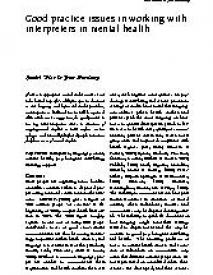Good practice issues in working with interpreters in mental health
If access to appropriate mental health services is not to be limited to people’s ability to speak a dominant or host language used by mental health providers, an interpreter or bicultural worker will be required. This article makes suggestions for good practice in working with interpreters either in situations of ongoing-armed conflict or with asylum seekers refugees and internally displaced people who have fled from areas of armed conflict.
Geachte bezoeker,
De informatie die u nu opvraagt, kan door psychotraumanet niet aan u worden getoond. Dit kan verschillende redenen hebben,
waarvan (bescherming van het) auteursrecht de meeste voorkomende is. Wanneer het mogelijk is om u door te verwijzen naar de bron
van deze informatie, dan ziet u hier onder een link naar die plek.
Als er geen link staat, kunt u contact opnemen met de bibliotheek,
die u verder op weg kan helpen.
Met vriendelijke groet,
Het psychotraumanet-team.
Reference:
Rachel Tribe; Jean Morrissey | 2004
In: Intervention: the international journal of mental health, psychosocial work and counselling in areas of armed conflict, ISSN 1571-8883 | 2 | 2 | 129-142
http://www.interventionjournal.com/sites/default/files/129_142%20Tribe.pdf
In: Intervention: the international journal of mental health, psychosocial work and counselling in areas of armed conflict, ISSN 1571-8883 | 2 | 2 | 129-142
http://www.interventionjournal.com/sites/default/files/129_142%20Tribe.pdf


